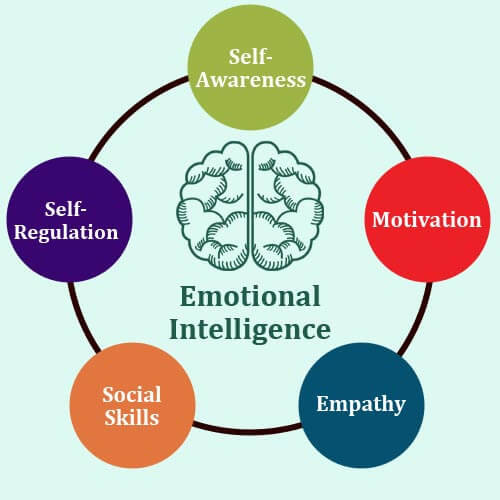Developing Emotional Intelligence
Developing emotional intelligence enables us to manage emotions effectively and is a key skill for children to learn. Daniel Goleman, an American psychologist, developed a framework of five elements to define emotional intelligence.

Image source: PsychCentral.com
1. Self-awareness
The ability to understand one’s own emotions and therefore be able to regulate feelings. People with high emotional intelligence are able to acknowledge their strengths and weaknesses and have insight into where they want to develop with a sense of self-confidence about their self-worth and capabilities.
2. Self-regulation
Allows a person to control their emotions and impulses so as not to make impulsive or careless decisions.
3. Motivation
Being motivated requires clear goals and a positive attitude.
4. Empathy
The ability to recognise how people feel; discerning the feelings behind others’ signals so that there is understanding and effective communication. Empathetic people are usually excellent at managing relationships. listening and relating to others.
5. Social skills
Having strong social skills allows for positive social interaction with others and the ability to establish and maintain relationships.
Read more about emotional intelligence in the early years below:
Podcast: Emotional Intelligence in the Early Years with Samantha Dholakia
Listen to the podcast below which focuses on emotional intelligence in early years education. Sam expresses her belief that emotional intelligence is a vital skill to impart to young children, as it underpins their actions, thoughts, and responses. They discuss the importance of self-awareness, self-regulation, effective communication, and social skills in a child’s emotional development. The conversation delves into the significance of understanding emotional regulation and how it contributes to building resilience in infancy. The discussion also touches on the role of the learning environment, emphasising the need for a balanced, supportive space that allows for self-expression and independence.

Watch: The Secret Life of 4 Year Olds
<undefined>The Secret Life of 4 Year Olds. Channel 4</undefined>
- Which elements of emotional intelligence are evident when you watch this video and observe the interactions between the children?






